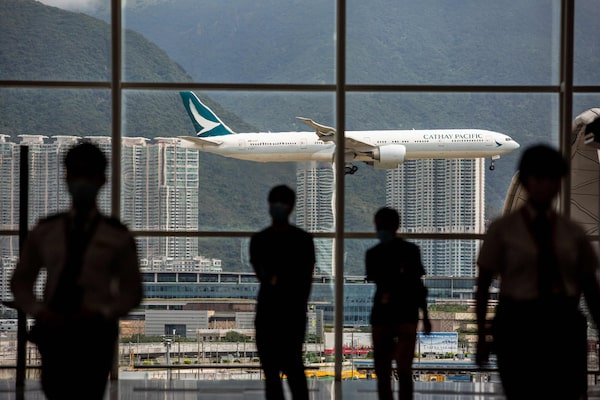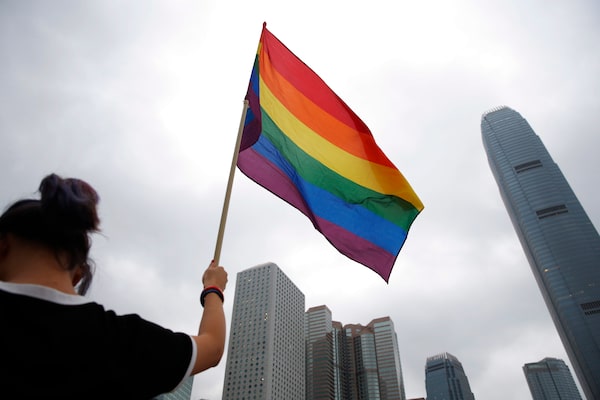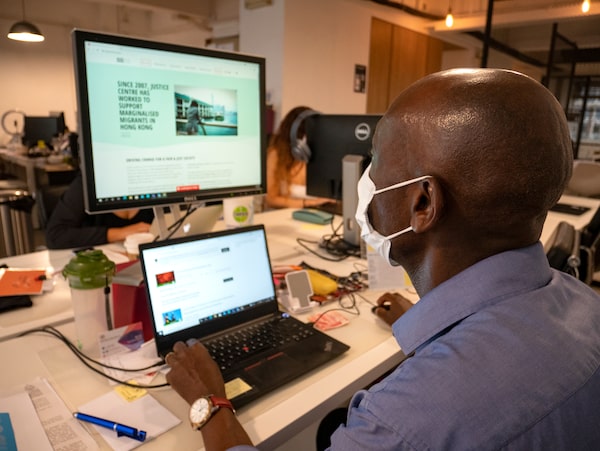A child plays in front of an information display of the Hong Kong skyline. Officials in this Chinese-controlled city of 7.4 million argue that space and resources are at a premium, which is why it accepts so few asylum seekers.Tyrone Siu/Reuters
JM sat in a small hearing room on the 30th floor of Hong Kong’s Immigration Tower, in the city’s Wan Chai District. Through a translator, the 34-year-old pleaded with immigration officials not to deport him back to Egypt, where he feared being killed for being gay.
JM, whom The Globe and Mail is identifying only by his initials because of continuous harassment over his sexuality after fleeing Egypt, was just one of thousands of asylum seekers whose cases were heard in this Chinese-controlled city in 2017. Almost all of them were unsuccessful.
A major air hub, with visa-free access from more than 140 countries, Hong Kong is – despite the best efforts of its government – a magnet for people fleeing conflict, abuse and poverty.
In fact, only 1 per cent of refugee claimants in Hong Kong are granted asylum – just 272 since 2009, according to government statistics. And recent changes to the law, including reducing the number of judges hearing cases and restricting which languages applicants can use, are poised to make applying for asylum even harder, advocates for refugees say, while further clogging up Hong Kong’s court system.
Officials argue that accepting more refugees would only result in even more people claiming asylum and would strain the limited resources and space in the city of 7.4 million.
By way of comparison, about 40 per cent of claimants are successful in the European Union, while Canada accepts upwards of 60 per cent. That’s where JM eventually ended up, in October, 2019, after years of fighting deportation orders in Hong Kong. The Globe recently spoke with him via video call from his new home in Montreal.
He had never intended to go to Hong Kong. In mid-2015, he decided he could no longer safely remain in an increasingly homophobic Egypt, fearing both his family and the police, who have been accused by Human Rights Watch of arbitrarily arresting LGBTQ people and widespread abuse.
JM travelled first to neighbouring Sudan, where he could apply for refugee status with the United Nations High Commissioner for Refugees. But such claims take time, and another conservative Muslim country did not seem like the safest place to stay, so he looked for somewhere he could travel to without having to apply for a visa.
He eventually settled on Hong Kong, landing in the city with an automatic 90-day visitor visa.
But what seemed fortuitous at first soon plunged JM into the Kafkaesque maze of bureaucracy that would dominate the next four years of his life.

A plane arrives at Hong Kong International Airport. Visitors from more than 140 countries can arrive here and automatically get a 90-day visitor visa.ISAAC LAWRENCE/AFP via Getty Images
When he presented himself at immigration, an official informed him that he couldn’t file a refugee claim until his three months were up, a situation that leaves asylum seekers in a dilemma, as they are “already in breach of the law by the time they make their claim,” said Raquel Amador, an expert on asylum policy at the Chinese University of Hong Kong.
This puts claimants at “immediate risk of detention,” Ms. Amador said, their limited freedom at the whim of the authorities. Nor are they protected by international law, because unlike the rest of China, Hong Kong is not party to the 1951 Refugee Convention. (Britain, the territory’s former ruler, declined to extend its treaty obligations to Hong Kong, and China has not done so either since taking over in 1997.) The best outcome asylum seekers can hope for is to be resettled in a third country. In the meantime, they face an uphill legal battle to avoid being deported, while dealing with an often hostile bureaucracy and strict restrictions on their right to work.
First, asylum seekers must file a non-refoulement claim, which prevents them from being sent back home immediately on the grounds that they face a risk of torture or persecution. Almost all non-refoulement claims are rejected.
JM’s own case files, shared with The Globe, provide a good example of why. In rejecting JM’s case, the adjudicator in Hong Kong relied on Wikipedia entries, vague ideas about the size of Egypt and shockingly backward notions about gay men. “Appellant has no external bodily appearance of a woman,” the adjudicator wrote in their report. “He is a tall, very stout man with well-built arms and physique … he wore no feminine garments e.g. no floral patterns but a plain dark purple t-shirt and pants, and no high heels … he spoke with a strong masculine tone and manner of speech, [and] he walked into the hearing room in the same manner and gait as any man.”
Even “if he is a homosexual,” the adjudicator continued, he was not out enough for this to be an issue, and “gay people had only been arrested [in Egypt] because they ‘had made a thing’ out of homosexuality by displaying the rainbow flag in a public concert.”
JM’s lawyer had warned him that the hearing would almost certainly be unsuccessful – the adjudicator had a reputation for being harsh – but he was nonetheless astonished. Nor did the humiliation and trauma stop there. “During the appeal time, someone from immigration asked me, ‘Please provide details about your sexuality, about sexual relationships you’ve had in Hong Kong,’” JM said. “What was I supposed to say? I did this, I kissed that?”

A participant in Hong Kong's 2018 Pride parade holds a rainbow flag. Hong Kong is a destination for many LGBTQ asylum seekers who've fled their home countries out of fear for their lives.Kin Cheung/The Associated Press
Because Hong Kong has a constitutionally protected right to judicial review, almost all cases end up before the courts and wind their way through the legal system, occasionally being sent back to immigration for new hearings – a process that can take years, puts considerable strain on the legal system and is a major cost to taxpayers.
In one case that came before the courts last year, immigration officials rejected a claim by a woman from Uganda, saying she was not at risk for being a lesbian – despite the fact, as the judge noted, “that not only is homosexuality a criminal offence in Uganda, it is also punishable by heavy imprisonments.” Other cases examined by The Globe showed adjudicators and immigration officials ignoring evidence in medical and psychological reports, relying on statistics about Coptic Christians to assess the danger to Muslims who convert to Christianity – considered apostasy in conservative Muslim countries – and claiming that LGBTQ people could just move elsewhere in their country to avoid persecution.
In a submission to the government last year, the Hong Kong Refugee Concern Network noted that “the quality of decisions at first instance is poor.
“Basic mistakes are frequently noted, including mistaking claimants’ countries of origin, using unverified information from Wikipedia as evidence to determine claims, or using outdated, substandard or otherwise non-credible sources as country of origin information.”
Ms. Amador said that “if you had fairer decisions in the earlier stages, you’d have less judicial review cases.
“But it’s all coloured by this idea that everyone is a bogus refugee,” she added. “The government uses the 1-per-cent success rate as evidence to back this up.”

Hong Kong Chief Executive Carrie Lam listens to questions at the legislature.Vincent Yu/The Associated Press
During a debate in the legislature on immigration regulations that came into force this year, multiple lawmakers argued that because 99 per cent of claims are rejected, they are therefore “false” and evidence of a problem of “bogus refugees.” The new regulations are aimed at tackling the backlog of non-refoulement cases before immigration officials and the courts by, for example, processing claims even if applicants are unable to attend their hearing or ordering claimants to communicate in a language they can be “reasonably considered” to understand, rather than providing an interpreter.
Along with recent changes to how judicial review cases are heard, experts warn that such changes may have actually further bogged down the system while putting asylum seekers at greater risk of being unfairly deported.
“Efficiency must not come at the expense of fairness, which is an overriding consideration,” the Hong Kong Bar Association wrote to lawmakers while they were considering the immigration bill. “It is troubling that none of the proposals in the bill seek to improve the fairness or quality of the decision-making – which would relieve pressure on the courts – and that the focus is instead exclusively placed on further reducing the procedural protections available to claimants.”
Preston Cheung, an advocacy officer at Justice Centre, a charity that supports refugees in Hong Kong, said many of the changes to the law will actually open up more avenues to challenge immigration decisions in the courts. He gave immigration officers being able to decide which languages a claimant can “reasonably” understand as an example.
“[The officer] would likely have no proficiency to judge whether someone is actually proficient,” Mr. Cheung said. “They’re saying they want to streamline the process and cut down on the judiciary’s workload, but all they’re doing is creating more cases” for the courts.
The legal process can take years, during which applicants are not permitted to work and must depend on limited government support. Even those who win their cases and are approved to stay in Hong Kong – while seeking resettlement elsewhere – are not granted any additional rights and must petition the government, and potentially the courts, to be allowed to work for a limited time.

GA, a refugee who works for Justice Centre Hong Kong, sits at his desk at the organization's headquarters in Hong Kong.James Griffiths/The Globe and Mail
GA, a refugee who has lived in Hong Kong since 2004, said the government often seems to be its own worst enemy in this regard, adopting strategies that don’t benefit anyone and create more work for all parties.
GA, who is also being identified solely by his initials because of his precarious legal status in Hong Kong, has little hope of being resettled in another country at this point. He is protected from deportation, so is essentially what Hong Kong’s system is designed to prevent: a long-term refugee. But the system refuses to see him as such, and he is not allowed to work for more than six months at a time.
“Basically they’re saying 180 days is enough because you may leave Hong Kong” after that, he said. “But that’s not the case.”
Every six months, he must apply for approval again, which makes it impossible to get a job anywhere other than with a charity or church. “I call them friends of refugees,” he said. “Because when you apply for a job they ask, ‘Do you have the right to work in Hong Kong?’ So you have to go to immigration, but then they ask for proof of employment before you can get permission. It’s like a chicken and egg situation.”
Tourists visit Kowloon Mosque for a tour about diversity and refugee communities this past August.Tyrone Siu/Reuters
The Hong Kong government has consistently justified its draconian refugee policy as a way to prevent large numbers of people claiming asylum in order to work in the city. Many pro-Beijing lawmakers, who have dominated the city’s legislature since the pro-democracy opposition was forced out this year, have called for an even tougher stand, painting refugees as criminals and con artists. But public attitudes toward asylum seekers and refugees are more empathetic, said Isabella Ng, a researcher at the Education University of Hong Kong.
Dr. Ng said surveys done biannually since 2016 showed “relatively positive changes in attitudes toward asylum seekers and refugees,” with the vast majority of people holding neutral to positive views and only 16 per cent viewing refugees negatively in the most recent poll last year.
She said one factor has been the growing number of Hong Kongers who are themselves seeking protection abroad in the wake of anti-government protests and a crackdown on the opposition since 2019.
“In the past two years, with growing fear and anxiety in the city, there is also more empathy toward people who are stuck and have to leave” their home countries, Dr. Ng added.
JM said the attitude of regular Hong Kongers was “super different” than that of immigration officials.
“A lot of young Hong Kong people, they help and support refugees, they are super kind,” he said. “A lot of churches helped me. I had a lot of people to help and support me.”
GA said that for years he has been speaking to schools and community groups about life as a refugee in Hong Kong.
“And I always end my speech with the point that nobody ever chooses to be a refugee. It can happen to anyone,” he said. “In the past year or so, I’ve been getting messages and e-mails saying, ‘Now we know what you were talking about.’”
The Globe in Hong Kong: More from James Griffiths
In early September, James Griffiths joined host Tamara Khandaker on the Decibel podcast to explain how a broad national security law has chilled the city’s once dyanmic pro-democracy movement. Subscribe for more episodes.
How an Ontario hotel chain got dragged into a Hong Kong national security case
Our Morning Update and Evening Update newsletters are written by Globe editors, giving you a concise summary of the day’s most important headlines. Sign up today.